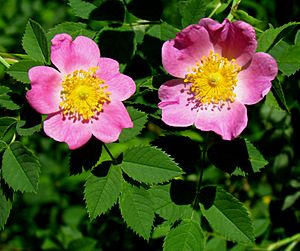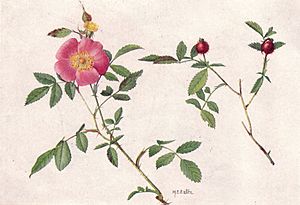Carolina rose facts for kids
Quick facts for kids Carolina rose |
|
|---|---|
 |
|
| flowers and leaves | |
| Conservation status | |
| Scientific classification |
|
| Kingdom: | Plantae |
| Clade: | Tracheophytes |
| Clade: | Angiosperms |
| Clade: | Eudicots |
| Clade: | Rosids |
| Order: | Rosales |
| Family: | Rosaceae |
| Genus: | Rosa |
| Species: |
R. carolina
|
| Binomial name | |
| Rosa carolina |
|
| Script error: The function "autoWithCaption" does not exist. | |
Script error: No such module "Check for conflicting parameters".
The Carolina rose (Rosa carolina), also known as the pasture rose or prairie rose, is a beautiful shrub. It belongs to the rose family and grows naturally in eastern North America. You can find it in almost all US states and Canadian provinces east of the Great Plains. This rose is very common and grows in many open places. These include thickets, open woods, roadsides, and even along railroad tracks.
Contents
What Does the Carolina Rose Look Like?
The Carolina rose has straight, needle-like thorns on its stems. This helps tell it apart from other similar roses, like R. palustris or R. virginiana, which have curved thorns. Its sweet-smelling flowers appear in early summer.
Flowers and Leaves
The blooms are about 6 to 8 centimeters (2.5 to 3 inches) wide. They have five light pink petals and a bright yellow center. Usually, only one flower grows at the end of a new stem. These roses do not bloom again later in the season. The stems are upright. New stems are grayish, while older, larger branches are brown. The leaves are smooth and dark green.
How It Grows
These plants spread easily through their roots. New growth can form small to large groups of roses, called thickets. These thickets can grow anywhere from 0.5 to 1 meter (18 to 40 inches) tall.
Where Does the Carolina Rose Live?
The Carolina rose grows in many different places. You can often find it in dry soils. It grows at the edge of prairies, woodlands, and savannas. It also thrives in thickets, upland forests, and dunes.
Wet and Dry Places
This rose can also grow in wet soils. It is found along stream beds, in swamps, and in low, grassy areas. Its wide range stretches from Nova Scotia, Canada, all the way south to Florida. It also grows west to Texas and north to Ontario.
Can You Grow Carolina Roses?
Yes, you can grow the Carolina rose in your garden! It needs plenty of sunlight, but it can also handle some shade. The soil should drain well, and the plant needs regular watering to grow strong.
Rose Hips and Bees
The plant produces rose hips, which are the small, round fruits that form after the flowers. These rose hips are safe to eat, but they taste very tart! Many different kinds of bees love the Carolina rose. They visit its flowers to collect nectar and pollen.
 | Toni Morrison |
 | Barack Obama |
 | Martin Luther King Jr. |
 | Ralph Bunche |



